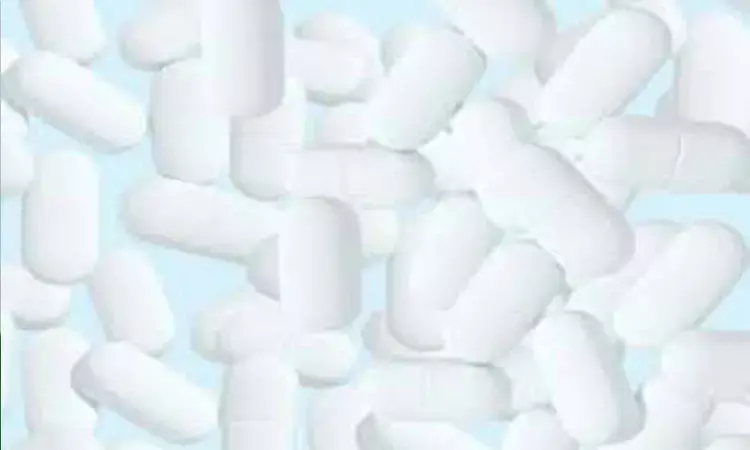- Home
- Medical news & Guidelines
- Anesthesiology
- Cardiology and CTVS
- Critical Care
- Dentistry
- Dermatology
- Diabetes and Endocrinology
- ENT
- Gastroenterology
- Medicine
- Nephrology
- Neurology
- Obstretics-Gynaecology
- Oncology
- Ophthalmology
- Orthopaedics
- Pediatrics-Neonatology
- Psychiatry
- Pulmonology
- Radiology
- Surgery
- Urology
- Laboratory Medicine
- Diet
- Nursing
- Paramedical
- Physiotherapy
- Health news
- Fact Check
- Bone Health Fact Check
- Brain Health Fact Check
- Cancer Related Fact Check
- Child Care Fact Check
- Dental and oral health fact check
- Diabetes and metabolic health fact check
- Diet and Nutrition Fact Check
- Eye and ENT Care Fact Check
- Fitness fact check
- Gut health fact check
- Heart health fact check
- Kidney health fact check
- Medical education fact check
- Men's health fact check
- Respiratory fact check
- Skin and hair care fact check
- Vaccine and Immunization fact check
- Women's health fact check
- AYUSH
- State News
- Andaman and Nicobar Islands
- Andhra Pradesh
- Arunachal Pradesh
- Assam
- Bihar
- Chandigarh
- Chattisgarh
- Dadra and Nagar Haveli
- Daman and Diu
- Delhi
- Goa
- Gujarat
- Haryana
- Himachal Pradesh
- Jammu & Kashmir
- Jharkhand
- Karnataka
- Kerala
- Ladakh
- Lakshadweep
- Madhya Pradesh
- Maharashtra
- Manipur
- Meghalaya
- Mizoram
- Nagaland
- Odisha
- Puducherry
- Punjab
- Rajasthan
- Sikkim
- Tamil Nadu
- Telangana
- Tripura
- Uttar Pradesh
- Uttrakhand
- West Bengal
- Medical Education
- Industry
USFDA ends emergency use of hydroxychloroquine to treat Covid-19

The drugs are traditionally used to treat malaria and certain autoimmune conditions, including lupus and rheumatoid arthritis. These can be taken to treat those conditions, but should not be taken to treat Covid-19 anymore, says FDA
Washington: The Food and Drug Administration (FDA) on Monday announced to withdraw the emergency use authorisation (EUA) for chloroquine and hydroxychloroquine (HCQ) as treatment for severe COVID-19 patients.
The decision on the so-called 'wonder drug' as touted by the US President Donald Trump is taken in the wake of recent clinical trials that showed that the antimalarial drugs were not effective against the coronavirus.
"In light of ongoing serious cardiac adverse events and other serious side effects, the known and potential benefits" of hydroxychloroquine no longer outweigh those risks, the FDA wrote on its website on Monday.
On March 28, the US FDA issued an emergency use authorisation for chloroquine and hydroxychloroquine for the treatment of Covid-19.
By April 24, however, the FDA issued a drug safety communication warning regarding hydroxychloroquine and heart rhythm disturbances that can lead to sudden cardiac death.
The drugs are traditionally used to treat malaria and certain autoimmune conditions, including lupus and rheumatoid arthritis. These can be taken to treat those conditions, but should not be taken to treat Covid-19 anymore.
After reviewing new information from large clinical trials, the FDA now believes that the suggested dosing regimens "are unlikely to produce an antiviral effect," FDA chief scientist Denise Hinton said in a letter announcing the decision, reports Politico.
Suspicions in the medical research scandal involving a little known health analytics company grew deeper after the termination of the faculty position of one of the Indian-origin co-authors of studies that were retracted by two influential peer-reviewed journals, including the one by The Lancet on the negative impact of HCQ.
The retracted Lancet study got worldwide attention after the World Health Organisation (WHO) paused trial of antimalarial drug hydroxychloroquine based on results of the study.
The study, which claimed to have analysed data from nearly 15,000 patients with Covid-19 and 81,000 controls, found that hydroxychloroquine has little benefit in treatment of the disease and instead, increases mortality in patients.
Researchers in the US earlier this month urged a temporary prohibition on prescribing chloroquine or hydroxychloroquine (HCQ), with or without azithromycin, to treat or prevent Covid-19.
Medical Dialogues Bureau consists of a team of passionate medical/scientific writers, led by doctors and healthcare researchers. Our team efforts to bring you updated and timely news about the important happenings of the medical and healthcare sector. Our editorial team can be reached at editorial@medicaldialogues.in.
Dr Kamal Kant Kohli-MBBS, DTCD- a chest specialist with more than 30 years of practice and a flair for writing clinical articles, Dr Kamal Kant Kohli joined Medical Dialogues as a Chief Editor of Medical News. Besides writing articles, as an editor, he proofreads and verifies all the medical content published on Medical Dialogues including those coming from journals, studies,medical conferences,guidelines etc. Email: drkohli@medicaldialogues.in. Contact no. 011-43720751


